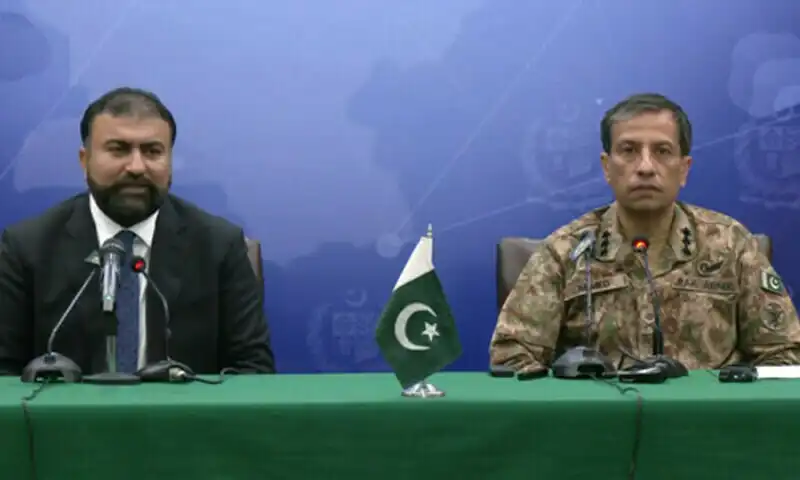- Web Desk
- Feb 19, 2026
India weaponised AI to twist Jaffar Express attack facts: DG ISPR
-

- Web Desk
- Mar 14, 2025

RAWALPINDI: Director General Inter-Services Public Relations (DG ISPR) Lt Gen Ahmed Sharif has disclosed details of the Jaffer Express operation, saying that terrorists launched their attack in a difficult-to-reach mountainous area, making the security forces’ response even more challenging.
During a joint press conference with Balochistan Chief Minister Sarfraz Bugti on Friday, DG ISPR revealed that the terrorists had targeted Jaffer Express in a remote area with no mobile network coverage. He confirmed that a Frontier Corpse (FC) post was nearby, and three FC personnel were martyred in the initial assault.
DG ISPR explained that security forces had to enter the train from the engine side to engage the attackers. “Terrorists held women inside the train while bringing other passengers outside in groups.”
He further highlighted that during the attack, Indian media was actively engaged in propaganda, using artificial intelligence (AI) to generate misleading footage. “The visuals broadcast by Indian media were AI-generated and old clips were recycled to push a false narrative.”
Providing a timeline of the attack, he said the first explosion on Jaffer Express occurred around 1 PM on March 11. “These terrorists have no link to Balochistan or Pakistan; they are not even connected to humanity,” he remarked.
DG ISPR further said that during the attack, the assailants were in contact with their mastermind in Afghanistan.
Lt Gen Ahmed Sharif said, “Many terrorists were seen fleeing during the operation. They had suicide bombers positioned in different groups, but our elite Zarrar Company skilfully neutralised them.”
DG ISPR, while terming the Jaffer Express operation as one of the most successful hostage rescue missions, said that security forces completed the challenging operation within 36 hours.
He said clearance operations were still ongoing in the surrounding areas. “Our forces demonstrated remarkable skill and bravery in executing the operation.”
Afghan link to Jaffar Express attack
Lt Gen Ahmed Sharif said that the attack was linked to Afghanistan. “This is part of an ongoing process, and these terrorists are linked to formations operating from Afghanistan.”
He revealed that one of the slain terrorists, Badruddin, was the son of the deputy governor of Afghanistan’s Badghis province. Another terrorist, Mujeebur Rehman, was identified as a battalion commander in the Afghan army.
Furthermore, he claimed that Pakistan’s eastern neighbour [India] was the main sponsor of the attack. “The Jaffer Express attack is not an isolated incident but part of a pattern aimed at destabilising Pakistan.”
Expressed concern over the growing terrorist presence in Afghanistan, Lt Gen Ahmed Sharif said, “We have evidence of the presence of militant groups, including Fitan al-Khawarij, in Afghanistan.” Their leadership operates from there, and they receive training and logistical support, he added.
He further said that after the US withdrawal, night vision devices and other advanced equipment had fallen into terrorist hands.
Nationwide counterterrorism efforts
The DG ISPR stressed that the fight against terrorism required a national effort. He recalled that after 2014, all political parties and stakeholders formulated the National Action Plan (NAP) to counter terrorism.
“The previous government reviewed the plan, and all stakeholders agreed on 14 measures to combat terrorism,” he said.
Sharing statistics on counterterrorism efforts, Lt Gen Ahmed Sharif revealed that security forces conducted 55,775 intelligence-based operations (IBOs) in 2024.
“So far this year, we have carried out 11,654 IBOs, averaging 180 operations daily. Since 2024, nearly 1,250 terrorists have been eliminated, while 563 security personnel have embraced martyrdom,” he said.
The DG ISPR said Pakistan was actively cracking down on illegal networks, including smuggling, non-customs-paid vehicles, and the Iranian oil trade. “This illegal network operates as a multi-billion-dollar mafia that does not want its operations disrupted,” he said.
Missing persons issue
Addressing concerns regarding missing persons, Lt Gen Ahmed Sharif said a commission had been established to investigate such cases.
“Out of 10,405 reported cases, 8,144 have been resolved, while 2,261 remain under investigation,” he said.
He noted that of the 2,911 cases reported from Balochistan, only 452 were pending.
Referring to insurgent groups, he questioned, “Who are the people in the Balochistan Liberation Army (BLA)? Are they missing persons, or are they present in training camps in Afghanistan?”
He also pointed out that thousands of people in Pakistan had fallen victim to terrorism, including individuals from all walks of life. “This issue is not unique to Pakistan. Do the US, UK, and India not have missing persons?” he asked.
“A narrative is being built against our institutions, but we must not forget that terrorism has claimed countless innocent lives in Pakistan,” he concluded.
Terrorists aim to destabilise Pakistan: Sarfraz Bugti
Speaking at the press conference, Balochistan CM Sarfraz Bugti condemned the attack, saying that such acts were intended to destabilise Pakistan. He praised the security forces for their swift and successful operation.
“These terrorists violated Baloch traditions, which regard such actions with great disdain. They have no connection with the Baloch people or their struggle.”
CM Bugti expressed gratitude to the international community for condemning the attack, saying that global solidarity against terrorism was crucial.




